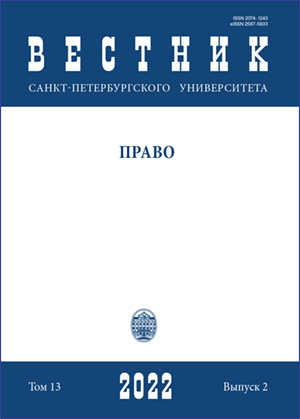Telemedicine: Problems of legal regulation in the context of digitalization of healthcare in Russia
DOI:
https://doi.org/10.21638/spbu14.2022.205Abstract
The article discusses the growing popularity of telemedicine. The authors point to the origins of the concept of telemedicine and its first application. Both positive and negative aspects of this phenomenon are presented. When analyzing the legislation and its application, the authors assess the current state of legal regulation of telemedicine in the context of digitalization of domestic healthcare, pointing out the presence of gaps in regulatory acts. These include the following issues: the unresolved mechanism of payment of such medical services, not fully determined the liability for violations in the field of telemedicine, for the purposes of treatment, through telemedicine technologies, the diseased person is still obliged to come to the doctor in a medical institution not solved the problem of procurement of drugs and the problems associated with Unified State information system in the field of healthcare and the Unified identification and authentication system in the field of licensing, the development of electronic prescriptions and the provision of warranty getting medicines for them, etc. Possible ways to resolve issues in the field of legal regulation for each individual issue are proposed. The authors present a clear practice of using telemedicine on the territory of the Russian Federation, namely in the city of Nizhny Novgorod. It is also worth noting that the conclusions reached by the authors are based on the analysis of the regulatory framework and current legislation. The medical and legal aspects of the application of telemedicine are considered in detail, namely the norms of legislative acts that are an important source in regulating the relations of this institution. Thus, the relevance and significance of the application of telemedicine as a promising and developing phenomenon of the future is emphasized.
Keywords:
telemedicine, healthcare, medical services, patient, attending physician, electronic prescription, telemedicine technologies
Downloads
References
Downloads
Published
How to Cite
Issue
Section
License
Articles of "Vestnik of Saint Petersburg University. Law" are open access distributed under the terms of the License Agreement with Saint Petersburg State University, which permits to the authors unrestricted distribution and self-archiving free of charge.






